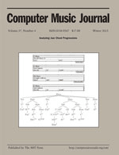
COMPUTER MUSIC JOURNAL
Scope & Guideline
Illuminating the Future of Interactive Musical Systems
Introduction
Aims and Scopes
- Human-AI Interaction in Music:
The journal explores the dynamics of human-AI partnerships in music creation, focusing on collaborative processes, co-creativity, and the implications of AI as a musical collaborator. - Computer-Aided Composition and Orchestration:
Research on tools and frameworks that facilitate computer-aided composition, orchestration, and real-time music systems is a core area, emphasizing innovative methods for enhancing musical creativity and expression. - Interactivity and Immersive Experiences:
The journal highlights the development of interactive musical systems, including the use of gestural control and immersive sound environments, promoting new forms of audience engagement and performance. - Sound Analysis and Synthesis Techniques:
A significant focus is placed on advanced sound analysis and synthesis techniques, including granular synthesis, spatial sound synthesis, and novel audio processing methods. - Cultural and Historical Perspectives on Computer Music:
The journal also addresses the cultural and historical contexts of computer music, providing insights into its development and the role of technology in evolving musical practices.
Trending and Emerging
- AI and Machine Learning in Music Creation:
There is a significant increase in research exploring the use of AI and machine learning as tools for music creation, enabling new forms of co-creation and artistic expression between humans and machines. - Real-Time Interaction and Performance Systems:
Recent papers emphasize the development of real-time interaction systems that facilitate live performances, focusing on enhancing the interactivity and responsiveness of both musicians and audiences. - Biosignal and Body-based Interfaces:
Emerging research on using biosignals and body movements as control mechanisms for musical expression is gaining traction, highlighting a trend towards embodied interaction with music technology. - Immersive and Spatial Audio Technologies:
There is a growing interest in immersive audio experiences, with research dedicated to spatial sound synthesis and acoustic localization, reflecting advancements in technology and audience engagement. - Cross-disciplinary Collaboration in Music Technology:
The journal is seeing an increase in interdisciplinary approaches that combine insights from fields such as psychology, computer science, and art, fostering innovative collaborations in music technology.
Declining or Waning
- Traditional Instrumentation in Computer Music:
There appears to be a decline in research focused on traditional instrumentation within the context of computer music, as the field increasingly shifts towards exploring innovative digital instruments and AI-driven compositions. - Static Soundscapes and Sound Design:
Studies that predominantly deal with static soundscapes and conventional sound design techniques are becoming less frequent, as there is a growing interest in dynamic and interactive sound experiences. - Historical Analyses of Computer Music:
While historical perspectives remain valuable, there has been a noticeable decrease in publications solely dedicated to historical analyses, possibly due to the emphasis on contemporary applications and future developments in technology.
Similar Journals

Musica Tecnologia
Bridging the Gap Between Artistry and EngineeringMusica Tecnologia is an emerging journal that explores the intersection of music and technology, published by FIRENZE UNIV PRESS. With its ISSN 1974-0042 and E-ISSN 1974-0050, the journal serves as a platform for innovative research on the technical aspects of music creation, distribution, and performance. Despite being relatively new, having converged its years from 2020 to 2024, it has already established itself within academic circles, as evidenced by its Q4 ranking in categories such as Computer Science Applications, Electrical and Electronic Engineering, and Music. While the journal does not currently offer Open Access, it provides a crucial avenue for both established scholars and emerging researchers in the arts and technology to disseminate their findings. The potential to influence practices in music technology is significant, making Musica Tecnologia a valuable resource for those looking to stay at the forefront of interdisciplinary research. The journal is located in Florence, Italy, and continues to build its reputation as a meaningful contributor to the fields of music and technology.
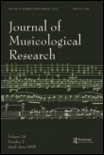
JOURNAL OF MUSICOLOGICAL RESEARCH
Decoding the Language of Music through ResearchJOURNAL OF MUSICOLOGICAL RESEARCH, published by Taylor & Francis Ltd, is an esteemed platform that delves into the field of musicology, contributing to the ongoing dialogue in music research and scholarship since its establishment in 1979. With an ISSN of 0141-1896 and an E-ISSN of 1547-7304, this journal serves as a vital resource for researchers, professionals, and students, offering insights into diverse musicological topics. Although currently categorized in Q4 in Music with Scopus rankings placing it at #110 out of 180 in the Arts and Humanities field, its commitment to excellence and broader discourses in music studies is evident. The journal does not have Open Access options, yet it provides accessible content through reputable academic channels, fostering scholarly exchanges within the community. It aims to publish high-quality research that advances understanding of musical practices and cultural implications, making it a critical resource for those passionate about music and its myriad influences.
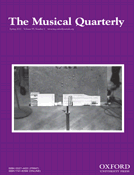
MUSICAL QUARTERLY
Navigating the Evolving Landscape of Music StudiesMUSICAL QUARTERLY, published by Oxford University Press Inc, is a distinguished journal in the field of music, with a publication history that stretches back to 1915. This esteemed journal, identifiable by its ISSN 0027-4631 and E-ISSN 1741-8399, provides a critical platform for scholarly discourse, analysis, and research in musicology and related disciplines, facilitating an understanding of both historical and contemporary musical practices. Although it operates without open access, it continues to attract a diverse readership of researchers, educators, and students alike, thanks to its well-curated articles and reviews that engage with music theory, history, and ethnomusicology. With a current Scopus rank of #119 out of 180 in the Arts and Humanities category and a 34th percentile ranking in Music, MUSICAL QUARTERLY plays a vital role in advancing knowledge and fostering collaboration within the music academic community. Its commitment to high-quality scholarship is reflected in its ongoing efforts to address the evolving landscape of music studies, making it an essential resource for anyone serious about exploring the rich tapestry of music scholarship.
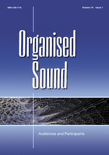
Organised Sound
Where Music Meets Cutting-Edge TechnologyOrganised Sound, published by Cambridge University Press, stands as a pivotal journal in the fields of Music and Computer Science Applications, reflecting its commitment to advancing interdisciplinary research related to sound and music technologies. Established in 1996, this biannual journal encourages the exploration of new forms of composition, performance, and listening practices using contemporary technological advancements. With an impressive Q1 ranking in Music and a notable place within the top 79th percentile of its category according to Scopus, Organised Sound provides a unique platform for researchers, practitioners, and artists to share innovative ideas and collaborate across disciplines. The journal's rigorous peer-review process ensures high-quality contributions that are informed by the latest theoretical and practical developments. Although currently not an open-access journal, it remains highly regarded for its scholarly depth and relevance in today’s rapidly evolving soundscape.

Musicologica Brunensia
Advancing Knowledge in the Art of SoundMusicologica Brunensia, an esteemed journal published by Masaryk University, Faculty of Arts, serves as a significant platform for the dissemination of knowledge in the field of musicology. Based in the Czech Republic, this Open Access journal has been facilitating scholarly communication since 2009, allowing unrestricted access to its rich array of research articles. With an ISSN of 1212-0391 and an E-ISSN of 2336-436X, Musicologica Brunensia proudly holds a Q3 ranking in the Music category as of 2023, reflecting its dedication to advancing research in the arts and humanities, particularly music. The journal accepts contributions spanning diverse topics within music studies, fostering interdisciplinary dialogue among researchers, professionals, and students alike. Located at Arne Novaka 1, Brno, 60200, Czech Republic, Musicologica Brunensia is poised to continue its journey of promoting innovative scholarship in musicology until 2024 and beyond, making it a valuable resource for anyone passionate about the field.
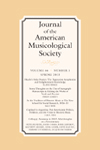
JOURNAL OF THE AMERICAN MUSICOLOGICAL SOCIETY
Advancing musicology through rigorous scholarship.JOURNAL OF THE AMERICAN MUSICOLOGICAL SOCIETY, published by University of California Press, is a prestigious peer-reviewed journal dedicated to advancing the field of musicology. With an ISSN of 0003-0139 and E-ISSN 1547-3848, this journal has been a cornerstone of scholarly communication since its inception in 1970 and continues to be relevant through 2024. Its esteemed standing is reflected in its Q2 ranking in the Music category and a respectable 71/180 ranking in the Arts and Humanities discipline, placing it in the 60th percentile among its peers. The journal provides an essential platform for researchers, professionals, and students to explore diverse topics in musicology, ranging from historical studies to contemporary analyses. While it does not currently offer Open Access options, its rigorous editorial standards ensure the publication of high-quality research that contributes significantly to the academic dialogue in music studies. With its address based in the United States at 155 Grand Ave, Suite 400, Oakland, CA 94612-3758, the journal remains a vital resource for those seeking to deepen their understanding of the complexities of music and its societal impacts.

Problemy Muzykalnoi Nauki-Music Scholarship
Enhancing Understanding of Music's Diverse DimensionsWelcome to Problemy Muzykalnoi Nauki-Music Scholarship, a leading journal in the field of music scholarship published by the esteemed Gnesin Russian Academy of Music. With an ISSN of 2782-358X and an E-ISSN of 2782-3598, this Open Access journal has been committed to the dissemination of high-quality research since 2009, making scholarly work accessible to a global audience. Covering diverse aspects of music theory, history, and its socio-cultural impacts, Problemy Muzykalnoi Nauki serves as an essential platform for scholars, educators, and practitioners in the arts and humanities, as well as in social sciences related to music education. While its Scopus coverage was discontinued in 2021, the journal remains influential, holding a rank of #48 in the Arts and Humanities category and a percentile of 67th, showcasing its relevance and rigor in the discipline. We invite researchers and students alike to explore the rich contributions made within these pages, fostering a deeper understanding and appreciation of music in contemporary society.

FONTES ARTIS MUSICAE
Cultivating knowledge at the crossroads of music and information.FONTES ARTIS MUSICAE, with ISSN 0015-6191 and E-ISSN 2471-156X, is a distinguished journal published by A-R EDITIONS, specializing in the fields of Music and Library and Information Sciences. Established in the United States, this journal serves as a vital resource for scholars, practitioners, and students engaged in the exploration and analysis of music and its associated disciplines. With an established converged publication history from 2002 to 2024, FONTES ARTIS MUSICAE has consistently contributed to the discourse within its scope, reflected in its current quartile rankings of Q4 in Library and Information Sciences and Q3 in Music for 2023. Although not an open-access journal, it offers essential insights and research findings, appealing to a diverse academic audience. Its position within the 18th percentile of the Arts and Humanities (Music) category and 11th percentile in Library and Information Sciences underscores its growing significance in these fields, making it a critical platform for advancing knowledge and fostering collaboration.

Muzikoloski Zbornik
Bridging Tradition and Modernity in Music ResearchMuzikoloski Zbornik is a prominent open-access journal in the field of musicology, published by the esteemed University of Ljubljana Press since 1965. Hailing from Slovenia, this journal has been dedicated to advancing the study of musical heritage, theory, and practice, serving as a vital platform for researchers, professionals, and students alike. With a notable Q2 category ranking in the field of music and a Scopus ranking of 109 out of 180 in Arts and Humanities, Muzikoloski Zbornik showcases high-quality research, fostering discourse and collaboration among scholars globally. The journal embraces a diverse range of topics, from ethnomusicology to music education, ensuring its relevance in an ever-evolving academic landscape. By providing unrestricted access to its content, it champions the dissemination of knowledge and supports the growth of the musicology discipline.
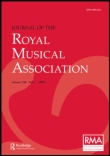
JOURNAL OF THE ROYAL MUSICAL ASSOCIATION
Fostering scholarly insights in music studies.JOURNAL OF THE ROYAL MUSICAL ASSOCIATION, published by Cambridge University Press, stands as a significant repository for innovative research and scholarly discourse within the field of music studies. Recognized for its contributions to the understanding of musical practices, theory, and history, this esteemed journal offers a platform for academics and researchers to disseminate their findings to a broad audience. With an ISSN of 0269-0403 and E-ISSN of 1471-6933, the journal has maintained a notable presence since its inception, merging insights from both traditional and contemporary musicology. It currently occupies a Q4 ranking in Music within the Scopus database, reflecting its inclusion within the arts and humanities landscape. While the journal traditionally operates under subscription access, its continuing commitment to advancing music scholarship ensures that it remains an essential resource for students, scholars, and practitioners alike, fostering greater understanding and appreciation of musical artistry from 1987 to the current era.